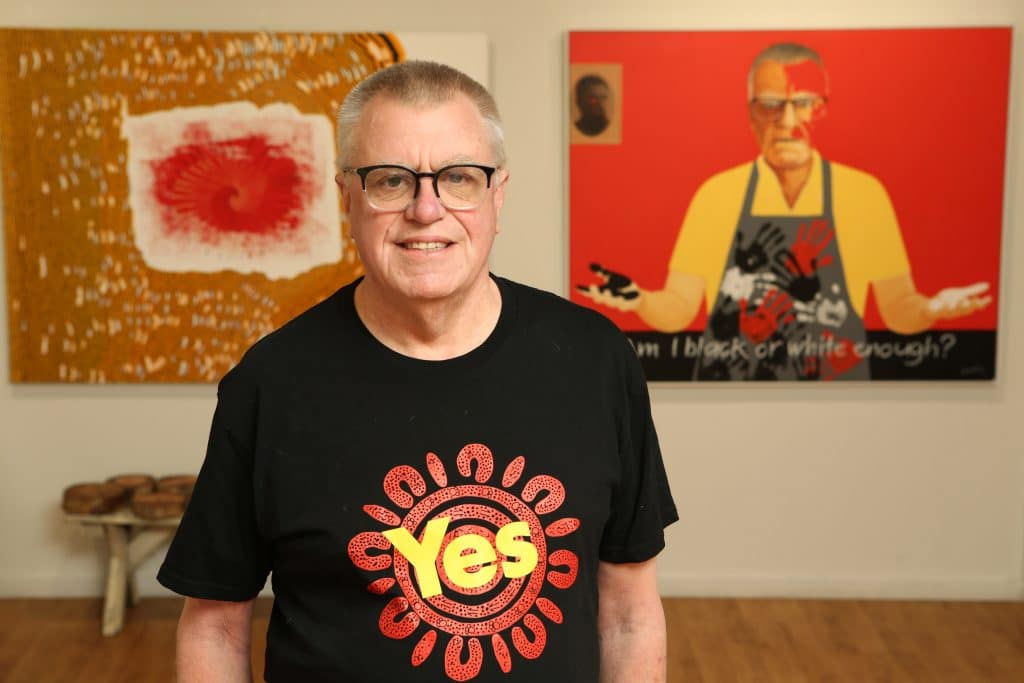
Glenn Loughrey
6 September 2023
On October 14, Australia will say either “Yes” or “No” to a Voice to Parliament for First Nations people.
The referendum is not about the Voice as a stand-alone mechanism, but the beginning of the process of Voice, Treaty, Truth, and Makarrata. This was the method of recognition agreed on at all 12 dialogues held with elders and Aboriginal people across Australia, leading up to the Constitutional Convention at Uluru in 2017. Here, the Statement from the Heart was drafted and signed at Uluru by 250 people, most of whom came from rural and remote communities.
The statement asks us to begin that journey with recognition, through a Voice enshrined in the constitution. This sets the process in place to address the other issues we are not yet ready to address: Treaty, Truth and Makarratta.
Read more: ‘This is about people not politics’: A personal reflection on the Voice
Recognition, and Voice in the constitution, rights the wrong of leaving us out in 1901 – an action taken on the mistaken belief that we would not be here in 100 years. By including us in this document we are recognised as equals and have the right to have a say on matters that affect us.
Enshrining the Voice in the constitution allows us to know that it won’t suffer the fate of other similar bodies. It will allow us to view the issues to be resolved with a long-term lens, rather than one driven by the electoral cycle, where policies come and go in the revolving door of difference.
What does the statement say?
The statement, which asks for a Voice, is a gentle document of transformation. It allows for all who live in this country to begin the hard work necessary to resolve the separation of colonisation.
The statement is a document that makes no accusations, desires no revenge, makes no threats. It simply offers a hand of welcome to participate in a journey, a process that will lead to a better future for all Australian people.
The statement lays out the issues we face because of dispossession but that is all. A statement of fact, not blame.
The statement is aspirational in language and process and as such is a process that will not resolve all issues immediately or even soon.
Read more: Faith leaders urge Christians to side-step public noise on Voice
The statement continues the long history of our people seeking to be heard, seen and included. This began in 1846 with a petition to Queen Victoria and has continued through various petitions, statements, and dialogues since. It has seen several legislated bodies, which have come and gone for a variety of ideological reasons, lots of promises by politicians to resolve the issues, and a cacophony of betrayals when those promises hit the cold hard light of politics and power.
The key words in the statement are seek (twice), call, and invite. These are requests, not demands.
The statement suggests the benefits of substantive constitutional change as the appropriate method for resolving systemic issues and recognising us as equals in the constitution and giving us a Voice on matters that affects us.
That statement simply lays out the story, offering this nation a gift.
This gift is the absurd compassion of allowing you to accept the invitation with a “Yes” to recognition and Voice. It is the gift of the opportunity to, through your democratic processes, shape your “Yes” into legislation fit for purpose.
Why Should You Support the Voice?
If you want to ensure our people are heard, seen, and recognised as being real and equal, and have a say on matters important to them, then you have a moral responsibility to act.
If you want to stop the trauma-induced violence and social deficit repeatedly reported on, and used as a weapon in this debate, then you have a moral responsibility to act.
If you are a fair person who treats everyone you see as equals, an equality our lived experience says is denied us, then you have a moral responsibility to act.
If you believe that all Australians are entitled to the privileges you enjoy, privileges that we don’t have, then you have a moral responsibility to act.
If you want Australia to be a fair, just, and united nation then you have the moral responsibility to say “Yes”. To say “Yes” to recognition and Voice enshrined in the constitution.
How Do I Educate Myself Before the Vote?
- Attend sessions that provide reliable information. There are many run by local politicians, organisations, and the various campaigns such as Yes23.
- Attend diocese sponsored sessions where I unpack the Statement from the Heart, and include a segment outlining the various “No” campaigns. You can find these and other videos on my YouTube channel here: bit.ly/3sr2X3u.
- Visit websites such as redshoeswalking.net/voice where I provide information, videos background material. Each of the campaigns provide similar sites but be aware that you will need to fact check information given on them. The ABC/RMIT factchecker site is a reputable fact checking site.
- Read Kerry O’Brien and Thomas Mayo’s publication “The Voice to Parliament Handbook” which provides fact checked information on what it is all about.
For more faith news, follow The Melbourne Anglican on Facebook, Instagram, or subscribe to our weekly emails.






